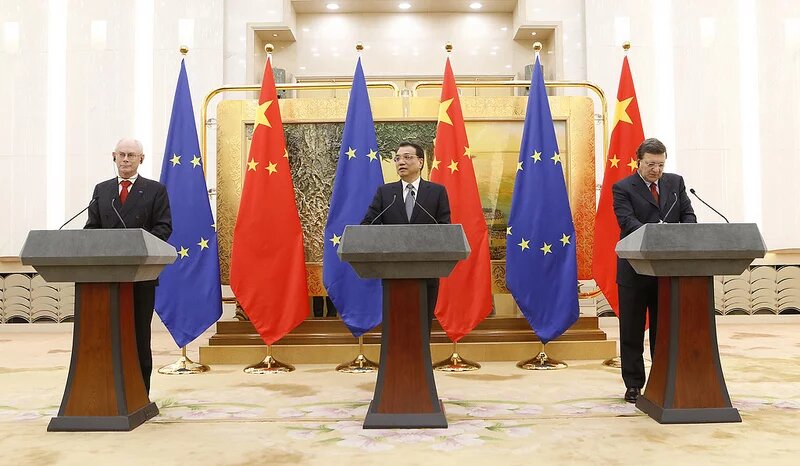
Many visits by important state officials took place during the Czech EU presidency. However, few of them brought about any significant changes for the future of the EU’s external relations. The EU-China summit in Prague will not be recorded in history as having been a breakthrough, or even as significant. Even though the atmosphere of the summit was correct and sincere, its results show that the six months between the cancellation of the summit in Lyon and the rescheduled session in Prague were not used to prepare any essential progress in mutual relations.
It was expected the summit would put Sino-European relations back on track and prepare the ground for the Copenhagen conference on climate change this December. The prepared positions of both sides demonstrated significant differences in opinion on most issues and were meant to form the basis for the creation of a joint output from the summit. Agreement was not achieved on any of the topics during the talks.
China was hoping for a shift in the questions of abolishing the arms embargo and achieving the status of a market economy. The European Code of Conduct on Arms Exports will probably be tightened before the embargo is lifted. The lifting of the embargo would not influence the situation much, but for mutual relations it represents a symbolic obstacle about which the Chinese are very sensitive, as it places them in the same category as countries such as Burma or Zimbabwe, against which arms embargoes are also in place. China will probably acquire the status of a market economy in 2015. The country correctly perceives the eternal postponement of this status as politically motivated, because frustration predominates in the EU over the inaccessibility of the Chinese market and the country’s insufficient protections for intellectual property rights.
For its part, the EU was hoping to close the gap between Chinese and European opinions on global warming and climate change at the Prague conference. However, China continues to insist on its right to pollute the environment just as Western countries have in the past, even though China exceeded the USA in its total volume of emissions in 2006. During the summit it was also unfortunately not possible to bring China to place greater pressure on the Burmese junta and force it to participate in talks with pro-democracy groups and release Aung Suu Kyi. Despite the EU’s wishes, a joint condemnation of North Korea’s April missile test also did not succeed; such a declaration might have helped return North Korean’s leadership to the negotiating table. The Partnership & Cooperation Agreement was not even mentioned. Differences on human rights were also not overcome. Prior to the summit it was once again a struggle to get human rights onto the agenda; the option of opening these questions up during the negotiations was promised, but as always, no practical steps on them were taken. A free press is important in this regard for the further development of civil society in China. It is possible to criticise corruption and lawbreaking today, but with further support the media might help relax the regime even further.
The only output of the Prague summit was a very brief communiqué summarizing the topics considered by the state officials, who exchanged opinions on economic, climate and foreign policy questions. In comparison to the summit in Beijing at the end of 2007, for example, which ended with a 47-paragraph declaration, this brief press release cannot be considered the result of successful negotiations. Three agreements were signed at the Prague summit on clean energy, research into new technologies, and SMEs. At the press conference, Chinese PM Wen warned that he had travelled 10 hours to attend a two-hour summit in Europe, which should be sufficient proof of China’s effort and interest in improving relations. However, he did not mention he would be rushing back to Beijing to participate in the three-day visit of the Brazilian president, during which 13 agreements on cooperation in various areas (oil, finances, agriculture, science, etc) were expected to be concluded. Wen also emphasized that it is important to work together in order to weather the current storm and contribute to economic revival in the world. He did not forget to add that both sides should mutually respect one another and not interfere in each other’s internal affairs.
The scenario was therefore repeated of indefinitely delaying key decisions and being unable to reach agreement on any topic except that of meeting again. Everything of importance, therefore, will have to play itself out at the summit in Beijing during the Swedish EU presidency. That meeting will be essential for the results of Copenhagen.
It seems EU politicians missed out on the moment when China grew into an assertive partner and global player. In China’s eyes, the EU has never been able to unify its approach to its Common Foreign and Security Policy. China therefore concentrates on bilateral relations with the various European states, which is completely logical, and exploits their disunity to its advantage. This trend will not change unless there is a fundamental change in the system of how common foreign policy decisions are taken. The USA grasped the rising significance of China much earlier, as can be seen by the Obama administration’s selection of a Chinese-speaking governor as their candidate for ambassador to Beijing, as well as by the extensive experience with China boasted by both the current and former US Treasury Secretaries. The EU could learn something from the USA in order to have the next EU-China summit end with better results.
Alice Savovová is the Executive Director of the Association for International Affairs in Prague. She graduated in international relations at the University of Economics in Prague where she was focusing on the European economic integration and controlling. She studied in China, Hong Kong and Brussels. Alice is interested in commercial relations with China and is actively following political issues in the South-East Asia.